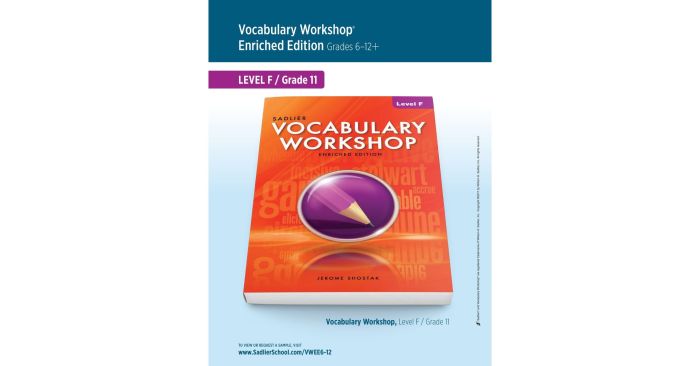Vocabulary workshop level f unit 3 completing the sentence – Embark on a linguistic adventure with Vocabulary Workshop Level F Unit 3: Completing the Sentence. This comprehensive guide unveils the intricacies of sentence completion techniques, empowering language learners to navigate the complexities of vocabulary building and sentence construction with confidence.
Delving into the nuances of Unit 3, we explore key vocabulary words, their usage, and context. Interactive activities ignite engagement and reinforce learning, while assessment strategies provide valuable insights into vocabulary progress. Join us as we unravel the secrets of sentence completion and elevate your language proficiency to new heights.
Vocabulary Development
Vocabulary workshops are designed to enhance learners’ vocabulary and improve their language proficiency. They provide a structured approach to learning new words and understanding their usage in context. Vocabulary building is crucial for language learners as it allows them to communicate effectively, comprehend texts, and expand their knowledge.
Strategies for expanding vocabulary include:
- Reading widely
- Using flashcards
- Playing word games
- Looking up unfamiliar words in a dictionary
Sentence Completion Techniques

Sentence completion exercises are an effective way to practice using new vocabulary in context. They require learners to complete sentences with the correct words, which helps them develop fluency and accuracy. There are different types of sentence completion exercises, such as:
- Cloze exercises: A word is omitted from a sentence, and learners must fill in the blank.
- Sentence unscrambling: A sentence is presented with its words in a scrambled order, and learners must rearrange them correctly.
- Sentence transformation: Learners are given a sentence and must change a specific word or phrase without altering the meaning.
Sentence completion exercises benefit learners by:
- Improving vocabulary usage
- Enhancing sentence structure
- Developing fluency
Unit 3 Content Analysis

Unit 3 introduces key vocabulary related to daily routines and activities. These words include:
- Wake up
- Get dressed
- Brush teeth
- Eat breakfast
- Go to school
- Play games
These words are used in various contexts, such as describing morning routines, daily schedules, and leisure activities.
Interactive Activities
To practice vocabulary from Unit 3, consider designing a game called “Morning Routine Bingo.” In this game, learners create bingo cards with common morning routine activities written on each square. As the instructor calls out vocabulary words, learners mark off the corresponding squares on their bingo cards.
The first learner to mark off all the squares on their card shouts “Bingo!” and wins.
This activity promotes vocabulary recall, recognition, and spelling.
Assessment and Feedback
Assessing vocabulary progress is essential for tracking learners’ understanding and identifying areas for improvement. Methods for assessing vocabulary knowledge include:
- Vocabulary tests
- Word lists
- Dictations
When providing feedback on vocabulary performance, focus on:
- Correcting errors
- Providing synonyms and antonyms
- Encouraging the use of new vocabulary in different contexts
Question Bank: Vocabulary Workshop Level F Unit 3 Completing The Sentence
What is the primary goal of Vocabulary Workshop Level F Unit 3?
To enhance sentence completion skills and expand vocabulary knowledge.
What types of sentence completion exercises are covered in the unit?
Cloze exercises, sentence building, and gap-filling exercises.
How does the unit assess vocabulary progress?
Through quizzes, self-assessments, and interactive activities.